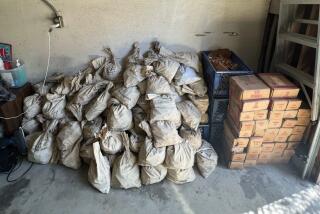Days of Penny Pinching May Be Numbered
- Share via
WASHINGTON — To Rep. Jim Kolbe (R-Ariz.), pennies represent a waste of space.
They’re inefficient, bothersome, nearly worthless. And, if Kolbe has his way, the coins would be largely taken out of circulation.
Kolbe has introduced a bill in Congress to greatly reduce the use of pennies in daily transactions. Under the proposed legislation, all sales in retail establishments would be rounded up or down to the nearest nickel, theoretically lightening the load of spare change jingling in the purses and pockets of America.
“People take pennies and either throw them into a jar or a can at home or leave them at a dish at the checkout counter,” Kolbe said. “Pennies’ only real purpose is for sales tax calculating.”
The Legal Tender Modernization Act, introduced July 17, is Kolbe’s plan to update not just the penny but other U.S. currency. It calls for a rounding system for penny usage: Merchandise that costs $4.53, for example, would be rounded up to $4.55. An item that costs $4.52 would be rounded down to $4.50. Pennies would still be legal to exchange, and credit card and money order charges would continue to be for the exact amount.
The bill also calls for designing commemorative $2 bills to be issued over a five-year period, similar to the current commemorative program for quarters, and it would prohibit the redesign of the one-dollar bill because it is not as susceptible to counterfeiting as bills of larger denominations. The measure also would authorize the Bureau of Engraving and Printing to print currency, postage stamps and other documents for foreign governments as long as it did not interfere with U.S. needs and was consistent with U.S. foreign policy.
As for the penny proposal, Kolbe maintains that it “favors neither the consumer nor the retailer because the probability of rounding up or down is 50% either way--it would all come out even in the end.”
But the lowly penny has its defenders.
Americans for Common Cents, a lobbying coalition, said the penny is a valuable asset to the economy, particularly for consumers who are thrifty. The coalition represents more than 50 organizations that either support or benefit from keeping the penny in the U.S. coin system, including various charitable and coin-collecting organizations and the zinc industry. (Once composed of copper, pennies are now made mostly of zinc.)
“Every penny does count,” said Mark Weller, executive director of the Washington-based coalition. “A large number of people out there . . . really watch their budgets closely, and the penny in pricing does matter.”
Weller said that by forcing merchants to round prices to the nearest nickel, the economy would be adversely affected, since prices would increase in some cases. Noting that many charities and lower-income families rely on spare change, Weller said consumers could “be hit with a $600-million ‘rounding tax’ every year without a circulating penny.”
But Kolbe said concerns over increased prices and taxes are invalid since the U.S. Mint would make fewer pennies and save money in transportation and distribution.
The U.S. Mint produced 14.3 billion pennies last year, a little more than half of all 28.1 billion coins minted. Mike White, a spokesman for the mint, said it costs eight-tenths of a cent to make a penny, but sales to the U.S. Treasury brought in $29 million in 2000.
“It’s profitable,” White said. “People see it as a real symbol of our economical stability.”
Some penny lovers want to keep the coin, if only for its sentimental value.
Musee Mecanique, an arcade near the Cliff House restaurant in San Francisco, is one of a few amusement centers that still offer penny-operated machines. Most of the arcade’s assortment of baseball skill games and hand-cranked machines that play silent films have been put in storage or upgraded. But the cost of the “love-teller” machine, which measures how “hot” patrons are, remains just a penny.
“If something is old enough it has a nostalgic value to it,” said Dan Zelinsky, a manager of the arcade. “If I have to, I’ll keep a sack of my own pennies and continue to recycle them instead of taking them to the bank.”
Kolbe shares some sentimentality for the penny. As a boy, he said, he would go to the general store in his hometown of Patagonia, Ariz., and buy penny candy after school.
But the 59-year-old congressman says that, though many may have similar childhood experiences, the coins can’t “linger around forever.”
The bill has been assigned to the House Financial Services subcommittee, and Kolbe acknowledges that its prospects are uncertain. But he said eliminating pennies in transactions is “common sense.”
“It’s been a great friend,” he said, “but we don’t have any need for it anymore.”
More to Read
Sign up for Essential California
The most important California stories and recommendations in your inbox every morning.
You may occasionally receive promotional content from the Los Angeles Times.













